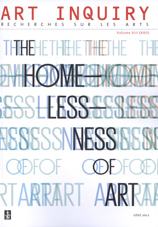The art of great masters on a mountain pass
The art of great masters on a mountain pass
Author(s): Teresa PękalaSubject(s): Fine Arts / Performing Arts
Published by: Łódzkie Towarzystwo Naukowe
Keywords: art; context; space; physicality; exhibition.
Summary/Abstract: The subject of the paper is the process, first of textualization, and then of the return of the importance of the physical environment of art. The general notion of context, understood as the sphere of meanings positioning works of art in relation to one another, as the physical environment of the art work and as a social-historical situation, is being displaced by the metaphors of space and place. This is facilitated by post-structuralist changes in philosophy and esthetics, which expose and challenge the philosophical linguistic assumptions of the conception of context. The article also deals with the problem of the cognitive value of metaphor, and the validity of using Heidegger’s category of homelessness (Un-zuhause – unhomeliness) in describing the situation in present-day art. The space of language is contrasted with the physical space of creation and reception of the work of art. The beginning of the process of art’s becoming physically homeless in the creative activities of the neo-avant-garde is at the same time a turning point in the treatment of spatiality, physicality and materiality in art. In order to present the changes characteristic of the postmodern context of art, I have used the interpretation of spatial-artistic realizations by the Pierre Gianadda Foundation in Étroubles in the Aosta Valley, in particular the description of the exhibition titled Sculptures de Degas à Picasso. The relationships between present-day art and the art of the distant past, which are established in the Museum in the Open Space can be treated as the culmination of the process of restoration of the importance of art’s physical environment. The text utilized the metaphors of the road bend (= turning point) and of the mountain pass, simultaneously pointing to the ongoing process of demetaphorization, resembling the one faced by the metaphors of the tourist and the wanderer.
Journal: Art Inquiry
- Issue Year: 2011
- Issue No: 13
- Page Range: 9-18
- Page Count: 10
- Language: English

